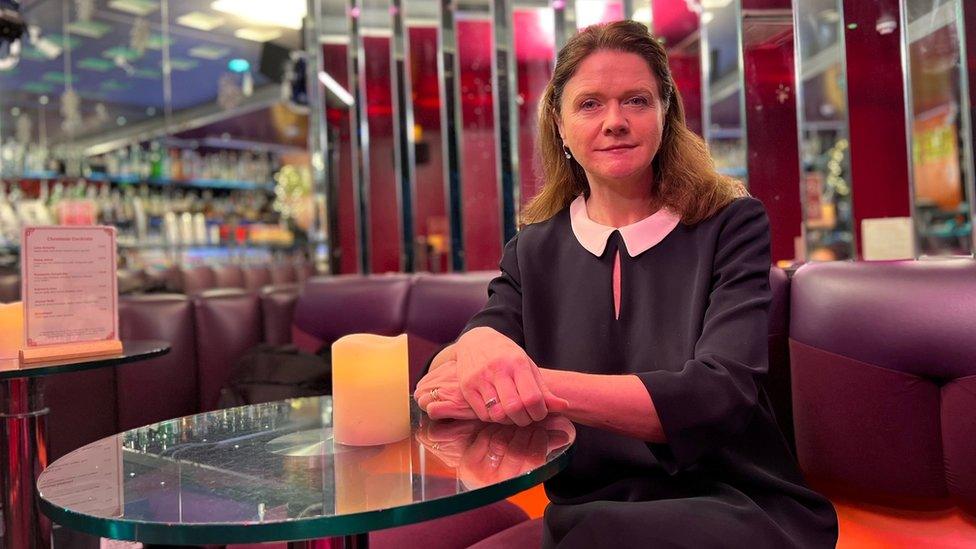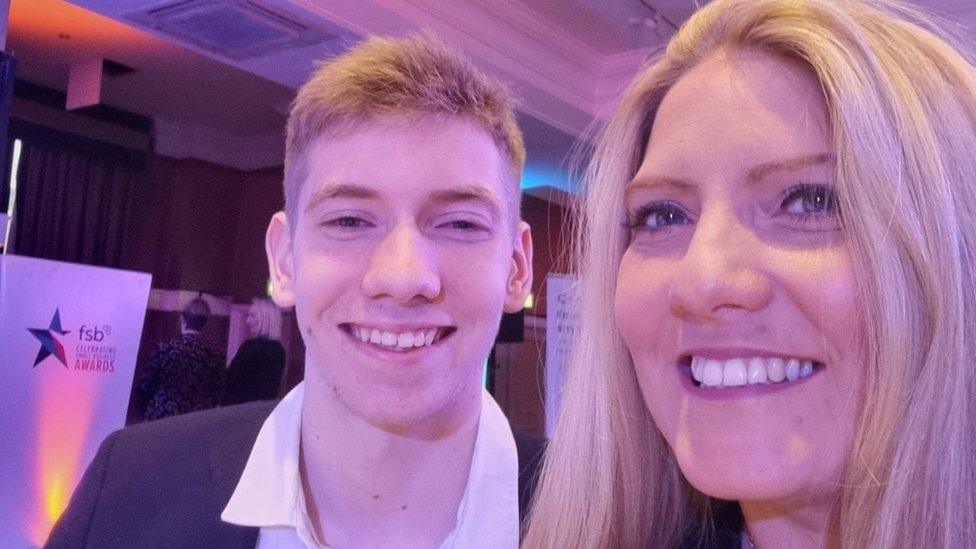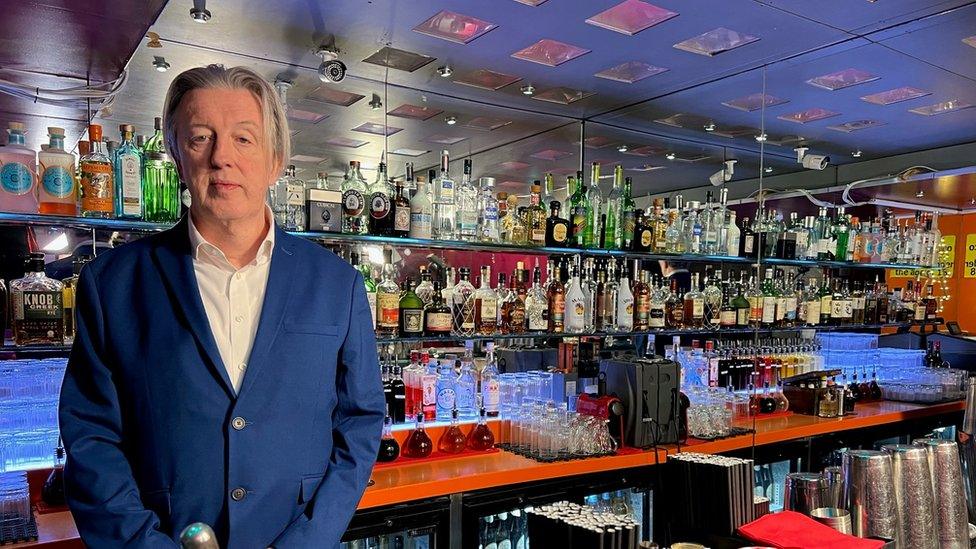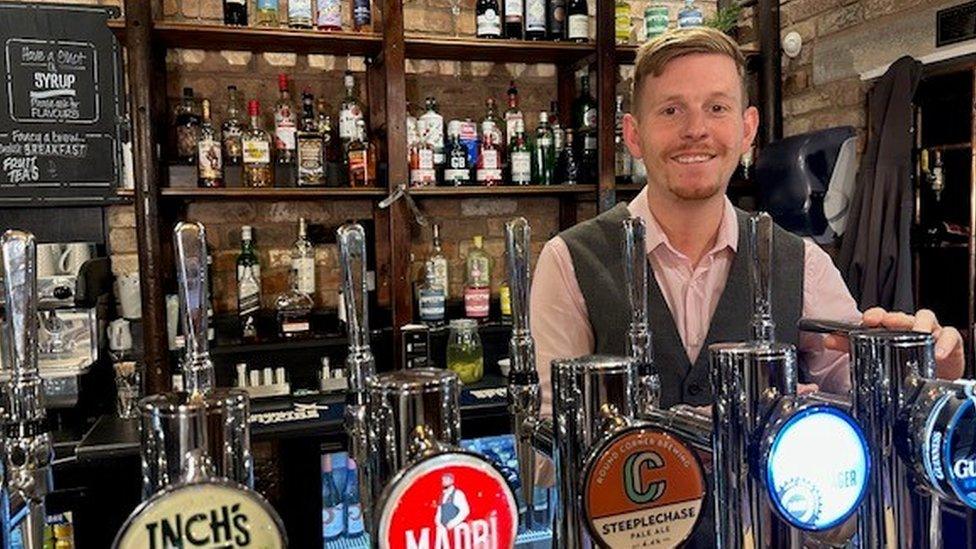New Year's Eve parties hit by rail strikes and cost of living
- Published

New Year's Eve celebrations look set to be hit by rail strikes and the cost of living crisis as industry experts say bars and restaurant bookings are down.
One in three reservations were cancelled in December, when the sector lost £2.3bn, UK Hospitality said.
There is "huge" concern that strikes will further hit New Year bookings and result in job losses in January, the Night Time Industries Association said.
The government says it is doing all it can to mitigate the impact of strikes.
Paul Kohler, owner of the CellarDoor a cocktail and cabaret bar in London's West End, was hoping the first New Year celebrations since coronavirus restrictions would go with a bang.
But he told BBC Breakfast rail strikes were a big factor in party plans fizzling out.
"New Year bookings are down again, we are hoping it will be good but people are losing faith in the transport system, they are worried about getting home at night," he said.
Train services continue to be hit by cancellations and delays as rail workers stage a series of national strikes in a dispute over pay, job security and working conditions.
Kate Nichols, chief executive of industry organisation UK Hospitality told BBC Breakfast losses in December were worse than expected due to rail worker walk outs.
"We know that when the train strikes were announced... you saw cancellation rates as high as 50-60% in the centre of London and 20-30% around the rest of the country directly attributable to those strike days."

Kate Nichols from UK Hospitality said one in three bar and restaurant bookings were cancelled in December
Meanwhile, with the cost of living in the UK near a record high, people are cutting down on going out at the same time that business running costs are going up.
Angela Baker from Bolton, owns Bakers coffee shop, bar and restaurant in Egerton, and Courses by Bakers restaurant at Turton Golf Club.
She said bookings over Christmas were "quieter than usual" and her New Year's Eve tickets were 70% to 80% sold.
"I think they're nervous about what's happening next with the cost of living crisis," she added.
"We've found Covid is still impacting us," said Ms Baker. "We've had people cancelling over the last few days due to Covid and lots of staff off ill."

Angela Baker with her son Joseph, who also works in the family hospitality businesses
She said while the costs of running her businesses were rising she did not want to have to up prices when her customers were struggling themselves.
Mr Kohler said he paid his staff the Real Living Wage for London of £11.95 an hour, which is more than the National Living Wage - known as the minimum wage - of £9.50.
Combined with "costs going up and up", his "profits are shrinking", Mr Kohler said.
"We don't have any profits at this stage - we are just surviving... hospitality is in real danger at the moment," he added.
Many businesses have lost up to 50% of trade during the festive period which they were relying heavily on to see them through early 2023, said Michael Kill, chief executive of the Night Time Industries Association.
Mr Kill said the government's delay in announcing any further help on energy bills for businesses had left many facing further uncertainty.
"We will without doubt now see a huge swathe of businesses and jobs lost in January due to the government's inaction," he added.
It comes after the British Beer and Pub Association said 386 pubs closed in England & Wales in 2022, with thousands more looking at altering their opening hours this winter to survive.
The ongoing cost of living crisis combined with further strike action means it is "going to undoubtedly be a very tough first quarter of the year for hospitality", said Ms Nichols from UK Hospitality.
Traditionally, bumper profits in December driven by Christmas celebrations make up for lower takings in January and February, she said.
But this year has seen "much more profitable sales in December being lost," she said. "That means those businesses are much more vulnerable and fragile."
Mr Kohler urged ministers to negotiate with rail workers to end strikes and to give more support on energy bills and business rates.
"Hospitality will die unless we get a grip," he said.
Ms Baker said: "I have had a number of friends who have lost or chosen to walk away from the hospitality business post-pandemic, and because of the cost of living.
"I have staff who were landladies who both gave up their pubs and came to work with me," she added.

Bar owner Paul Kohler said the hospitality industry was in "real danger" due to rail strikes and the cost of living crisis
Ms Baker said hospitality businesses like hers relied on busy Christmas and New Year periods to help them weather the quieter winter months ahead.
"With Courses being at a golf club, the season doesn't start again until March so we are expecting a quiet couple of months," she said.
"But even with Bakers coffee shop, January is a notoriously tough month because everybody starts the new year with good intentions."
The government said it recognised this was a difficult time for hospitality and night time businesses and said "we remain firmly on their side".
A spokesperson highlighted the Energy Bill Relief Scheme and a Business Rates package they said was worth £13.6billion over the next five years.
"We are doing all we can to mitigate the impact of this strike action, but the only way to stop the disruption completely is for union bosses to get back round the table and call off these damaging strikes," the spokesperson said.
Related topics
- Published9 May 2024

- Published21 December 2022
